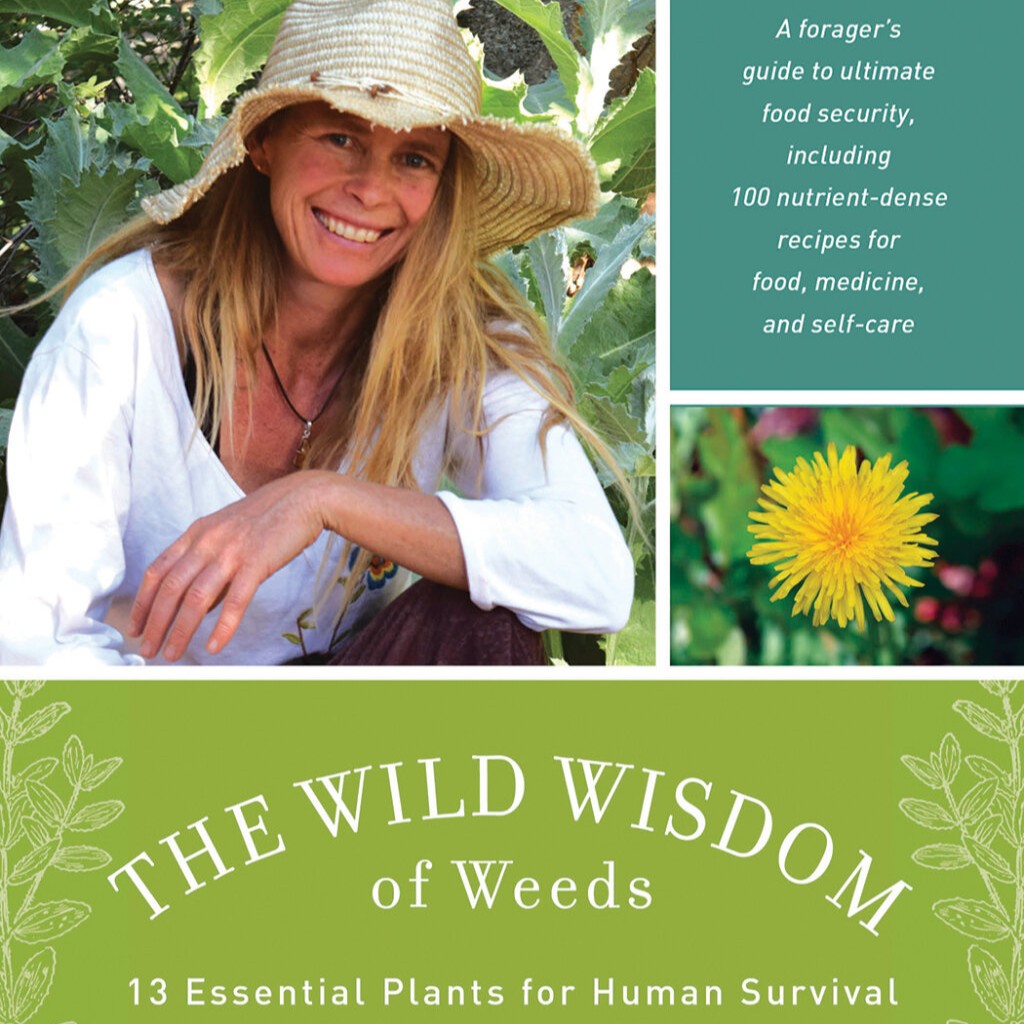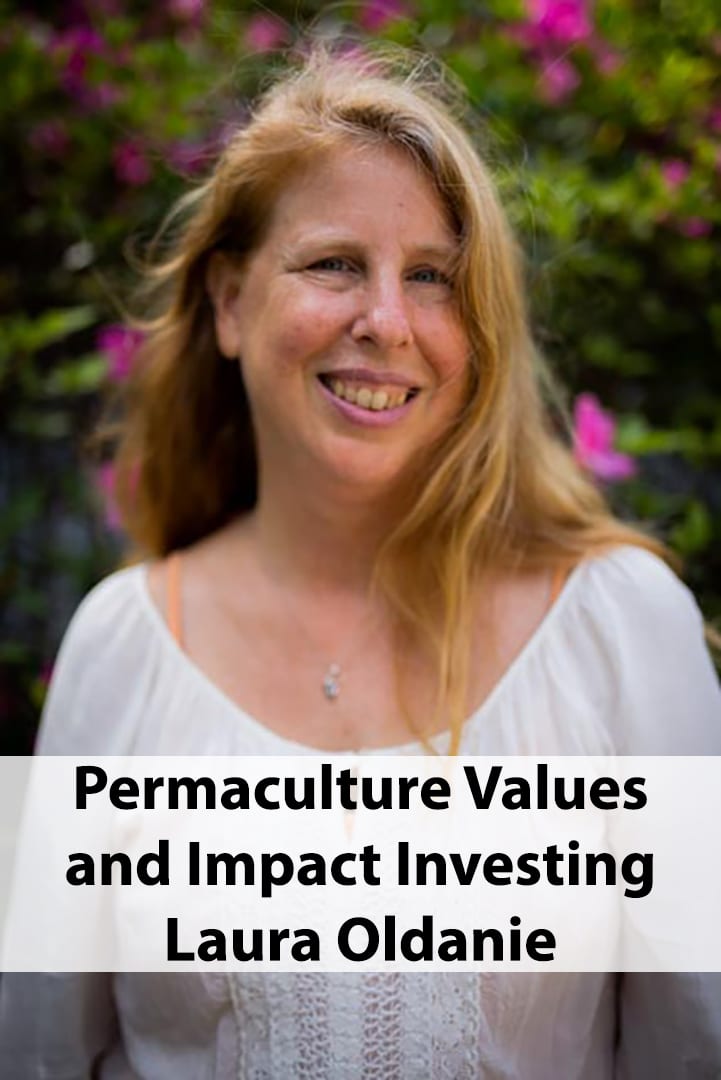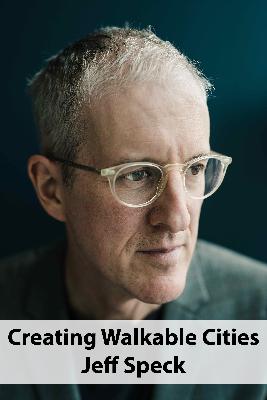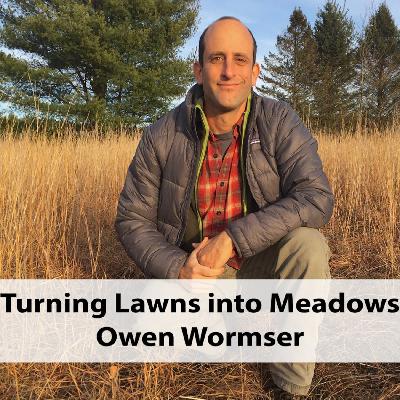Discover The Permaculture Podcast
The Permaculture Podcast

568 Episodes
Reverse
My guest for this episode is Katrina Blair, author of the wonderful book The Wild Wisdom of Weeds from Chelsea Green Publishing. Katrina lives in Durango, Colorado at Turtle Lake Refuge, home to the Turtle Lake Community Farm and Wild Food CSA, and Local Wild Life Cafe.
My guest for this episode is Stephen Barstow, author of Around the World in 80 Plants.
Together, we talk about his incredibly diverse garden in Norway where he grows over 2,000 edible plants in a rather small space. We begin with his background and how he came to have an interest in edibles, from his beginnings as a foraging vegetarian, to his beginning to eat and collect plants from wherever he traveled. He shares with us his love of edible ornamentals, or what Stephen calls edimentals, and he also recommends some to start with when first beginning to introduce more of these species into your garden.
Resources
Edimentals.com (Stephen’s Website)
Around the World in 80 Plants (Chelsea Green Publishers)
Around the World in 80 Plants (Permanent Publications)
Sturtevants Edible Plants of the World (PDF. Large File)
My guest today is Nathan Carlos Rupley. A member of my permaculture community, he spends his time as a stay-at-home dad, self employed-artist, and aspiring hunter-gatherer.
When not hanging out with his family or walking in the woods, you can find him reading about a wide range of subjects including simple living, foraging, native agriculture, natural building, “primitive” technology, philosophy, applied ecology, theology, and much more. He brings this knowledge to the table today as we discuss what he’s learning from the native plants of his ancestors.
The exploration of these plants and the related cultures provide insights into his place in the world and where he comes from. This leads to a conversation that ranges around a variety of thoughts including how we can learn more about plants and their uses by studying folk and Latin binomial names. What understanding ancestral plants can teach us about our identity. The impacts of colonization, on the colonized and colonizer. And being good mentors and ancestors now and for the future.
You can email Nate at nathanrupley@yahoo.com, with any comments, or questions, if you want to rewild your yard, or, if you’re ever in Central Pennsylvania, would like to join him for a foraging class or plant walk.
Resources
Nathan Carlos Rupley (Website)
Nathan Carlos Rupley (Patreon)
Nathan_Carlos_Rupley (Instagram)
Gathering on YouTube
Samuel Thayer / The Forager’s Harvest
Steve Brill
Backyard Medicine by Julie Bruton-Seal and Matthew Seal
Wild Urban Plants of the Northeast by Peter Del Tradici
Fandabi Dozi (YouTube)
Ron Eglash - The fractals at the heart of African designs (TED Talk)
Visit Our Sponsor: Foraged.Market
This episode is a remaster of my first interview with Eric Toensmeier, originally recorded in the early days of the show way back in 2012 when I still lived on the land in Pennsylvania. I’m sharing this as a follow-up to the most recent episode before this one where Eric joined me for another interview to talk about his current work on Alley Cropping. Depending on when you are listening to this, if you haven’t heard that show, definitely give it a listen. You’ll find that right before this one in the archives.
If you are not familiar with Eric and his work, he is the author of numerous permaculture and permaculture-adjacent books, all of which I highly recommend for your library. Most recently, that includes Carbon Farming: A Global Toolkit of Perennial Crops and Regenerative Agriculture Practices for Climate Change Mitigation and Food Security. Another title where Eric is the sole author is Perennial Vegetables: From Artichoke to Zuiki Taro, a Gardener’s Guide to Over 100 Delicious, Easy-to-grow Edibles. He is the co-author, along with Dave Jacke, of Edible Forest Gardens and also wrote Paradise Lot with Jonathan Bates, the former of which is probably his most popular title in the permie community.
Our conversation begins with Eric’s bio. He then answers some listener questions on perennials, then delves into perennial plants, the broad-scale application of permaculture, and removing some of the fear factors of implementing a forest garden. Throughout you will hear both of us touch on plants we would like to see improved and simple ways anyone who is growing a garden can help domesticate and improve edible perennials.
- You can find Eric at PerennialSolutions.org
- His latest venture, The Perennial Agriculture Institute, is at PerennialAgriculture.Institute.
- You can also read Eric’s current writing and support his ongoing efforts at patreon.com/erictoensmeier.
Resources
Eric Toensmeier
Perennial Solutions
PerennialAgriculture.Institute
Edible Forest Gardens
Keyline Design
USDA PLANTS Database
Books
Billy Joe Tatum's Wild Foods Field Guide and Cookbook (Out-of-Print. Bookfinder.com link)
Breed Your Own Vegetable Varieties by Carol Deppe
Creating a Forest Garden by Martin Crawford
Edible Water Gardens by Nick Romanowski (Out-of-Print. Bookfinder.com link)
The New American Landscape: Leading Voices on the Future of Sustainable Gardening
Return to Resistance: Breeding Crops to Reduce Pesticide Dependence by Raoul Robinson
Uncommon Fruits for Every Garden
Wild Urban Plants of the Northeast - A Field Guide
Support the Podcast!
Donate Directly: via PayPal -or- Venmo @permaculturepodcast
Join The Patreon: https://www.patreon.com/permaculturepodcast
Today I’m joined by my friend Joshua Hughes as he shares the continued work of the team he’s a part of to create a jungle to marketplace supply chain with the launch of Rewild Organics.
Learn More
Support the Podcast!
Donate Directly: via PayPal -or- Venmo @permaculturepodcast
Join The Patreon: https://www.patreon.com/permaculturepodcast
Joshua Hughes return to share information about his latest venture Blacksheep Regenerative Resource Management, a invest with social responsibility.
Learn More
Support the Podcast!
Donate Directly: via PayPal -or- Venmo @permaculturepodcast
Join The Patreon: https://www.patreon.com/permaculturepodcast
My guest today is Laura Oldanie, a permaculture practitioner and the author behind the website Rich and Resilient Living, which focuses on how we can live a life and make financial decisions that lead to a regenerative future.
Learn More
Support the Podcast!
Donate Directly: via PayPal -or- Venmo @permaculturepodcast
Join The Patreon: https://www.patreon.com/permaculturepodcast
Today's guest, in an interview recorded by co-host David Bilbrey, is the microbiologist and soil researcher Dr. Elaine Ingham.
Learn More
Support the Podcast!
Donate Directly: via PayPal -or- Venmo @permaculturepodcast
Join The Patreon: https://www.patreon.com/permaculturepodcast
My guest for this episode is Joshua Peace Seeker Hughes, an American permaculture practitioner living and farming in Costa Rica. His work there, which forms our discussion today, includes issues of land preservation through bottom-up solutions, regenerative resource-based economies, divestment, changing our lifestyles, the real wealth in of resources versus the illusion of money, and how we are in a period of transformation that requires transitional ethics.
Learn More
Support the Podcast!
Donate Directly: via PayPal -or- Venmo @permaculturepodcast
Join The Patreon: https://www.patreon.com/permaculturepodcast
My guest today is Jeff Speck. Jeff is the author of Walkable City and Walkable City Rules. As an urban planner and city designer he specializes in, and advocates for, human modes of transportation: first and foremost walking, but also biking.
Learn More
Support the Podcast!
Donate Directly: via PayPal -or- Venmo @permaculturepodcast
Join The Patreon: https://www.patreon.com/permaculturepodcast
In this episode from 2014, one of my favorite people from the permaculture community, Karryn Olson, joins us to share a pattern language she’s identified for women in permaculture, which we can use to create a constructive permaculture movement so that together we can design a world with ever greater beauty, abundance, and inclusivity.
Learn More
Support the Podcast!
Donate Directly: via PayPal -or- Venmo @permaculturepodcast
Join The Patreon: https://www.patreon.com/permaculturepodcast
My guest for today is Rhonda Baird, editor of Permaculture Design Magazine, and designer and educator at Sheltering Hills Design, LLC.
Learn More
Support the Podcast!
Donate Directly: via PayPal -or- Venmo @permaculturepodcast
Join The Patreon: https://www.patreon.com/permaculturepodcast
Rhonda Baird, the editor of Permaculture Design Magazine and teacher and designer at Sheltering Hills Design, LLC., joins me to continue our conversation about creating change. In our first interview, we spoke about the way that we can work on ourselves as individuals. Today we move from the inside to the out with how we can organize and support others and our community.
Learn More
Support the Podcast!
Donate Directly: via PayPal -or- Venmo @permaculturepodcast
Join The Patreon: https://www.patreon.com/permaculturepodcast
When I left my permaculture design course I was fairly comfortable walking the landscape and looking for areas of shade or full sun, and tracking how that would change throughout the day. To walk barefoot after a brief rain to feel where the soil drained quickly or to find spots where water pooled, even if I couldn’t see it with my eyes. To build either a water or an A-frame level to plot and map contours. I knew how to make a base map, a plant list, and to use those to put together a design. With shears and a pocket knife, I could prune limbs or loosen pot-bound roots. With a shovel and spade, I could dig holes and put plants in the ground.
Learn More
Support The Podcast!
Donate Directly: via PayPal -or- Venmo @permaculturepodcast
Join Our Patreon: Patreon.com/PermaculturePodcast
My guest today is Owen Wormser. Owen is a sustainable landscape designer from Western Massachusetts and author of Lawns into Meadows: Growing a Regenerative Landscape, from Stonepier Press.
Learn More
Visit Our Sponsor: Foraged.Market
Donate Directly: via PayPal -or- Venmo @permaculturepodcast
Want to listen to more conversations about Permaculture?
Browse the extensive archives of the show.
Can you live an enjoyable, self-indulgent life while remaining thrifty and at the same time not overtaxing Earth’s resources? To have all of that sounds too good to be true.
Learn More
Donate Directly: via PayPal -or- Venmo @permaculturepodcast
Want to listen to more conversations about Permaculture?
Browse the extensive archives of the show.
My guest today is Jerome Osentowski, founder of Central Rocky Mountain Permaculture Institute, a long time permaculture practitioners and teacher, and author of the new book The Forest Garden Greenhouse, available from Chelsea Green Publishing.
Learn More
Donate Directly: via PayPal -or- Venmo @permaculturepodcast
Want to listen to more conversations about Permaculture?
Browse the extensive archives of the show.
My guest today is Robyn Mello, the program director for Philadelphia Orchard Project, and is a deeper look at her life, work, and thoughts within and beyond that project, which she provided a brief overview to in Episode 1609: An Introduction to the Philadelphia Orchard Project. Give that episode a listen to learn more about how this non-profit installs orchards throughout the city of Philadelphia.
Learn More
Donate Directly: via PayPal -or- Venmo @permaculturepodcast
Want to listen to more conversations about Permaculture?
Browse the extensive archives of the show.
This Permabyte is a reading by Byron of his article "A Lesson in Identity".
Learn More
Donate Directly: via PayPal -or- Venmo @permaculturepodcast
Want to listen to more conversations about Permaculture?
Browse the extensive archives of the show.
Enjoy this episode? Become a Patron.
Learn More












I'm not sure whether you're seeing comments from here too, but yes! I've always found this podcast informative and inspiring. I would love new episodes, in any form. but take care of yourself
sounds exciting, but it's the same old tiresome tropes being pushed out by 'permaculturists'. yawn
is this interviewer a real person or Ai?
how awesome to find this interview with the Amazing #AndrewMagazine
Thank you for making this! 🙂
Better title: Alan Savory reads prepared responses. Like most others, this interviewer is very credulous, as if no research is available, and we must rely on storytellers. Years ago, I visited ACHM, Savory's land in Zimbabwe. It didn't take long to see that Savory is mostly marketing. At the time, his enormous ranch wasn't self-sufficient--and there was no plan to make it so. The income was from elephant hunts (yes, elephant hunts), international grants, and his speaking fees/ book sales. The photos from his TED talk are deceptive. (I visited the specific sites with land managers who were there contemporaneously.) Not everything he says is wrong, but much of it is contravened by research (e.g., trade-offs between hoof disturbance and soil compaction).
This is really great news. Your show has helped my mindset change more towards acceptance of myself and the world. The discussions are inspiring and thought provoking. I love applying some of the concepts you talk about to my own life, it's really true to the core reflection on you and your guests end, but transforms into guidance for this listener :)
sweet and practical. couldn't listen to all of it cause sounds quality of the interviewee was too deep and distorted.
horrible sound. I stopped listening. want to hear her stuff though
Why haven't the earlier episodes been downloaded?